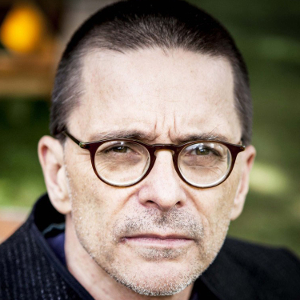NOTE: Images in this archived article have been removed.

[This is an excerpt from the new book Plain Radical: Living, Loving, and Learning to Leave the Planet Gracefully, published by Counterpoint/Soft Skull, which tells the story of Robert Jensen’s intellectual and political collaboration with teacher/activist Jim Koplin. Note: We have previously published other excerpts from Robert’s book here and here.
Over his lifetime, Jim Koplin made his analytical way through the hierarchical systems that define power in our world— patriarchy, white supremacy, capitalism, imperialism—always focusing on how systems operate not in isolation but as part of complex webs. Pull on one strand in a web, he would say, and the whole web is affected. Trying to analyze how power works in a society by looking at hierarchies one by one, out of context, was for Jim as limiting as trying to learn about a place by studying organisms one by one, without paying attention to the whole ecosystem.
In assessing these systems of illegitimate authority and the structures through which they work, Jim paid attention not just to differences—to the specific histories and contemporary practices of each system—but also to similarities, particularly how each of those systems rests on an attempt to naturalize its underlying domination/subordination dynamic: men over women, white over non-white, U.S. citizens over the people of the developing world, wealthy over working and poor people. These systems are mutually reinforcing, with the justification for one hierarchy potentially strengthening the justification for others.
How does this work? Whatever the source, most people’s philosophical and theological systems are rooted in basic concepts of justice that involve equality and the inherent dignity of all people. Most of us endorse values that, if we took them seriously, should lead to a rejection of the violence, exploitation, and oppression that defines the modern world. If only a small percentage of people in any given society are truly sociopaths—people incapable of empathy, those who are not disturbed by, or even enjoy, cruel and oppressive behavior—then a radical critique of hierarchies should make sense to most people. Yet the hierarchies endure, for reasons that are actually fairly simple to articulate:
- The systems and structures in which we live are hierarchical.
- Hierarchical systems and structures deliver to those in the dominant class certain privileges, pleasures, and material benefits, and a limited number of people in subordinated classes will be allowed access to those same rewards.
- People are typically hesitant to give up privileges, pleasures, and benefits that make us feel good.
- But, those benefits clearly come at the expense of the vast majority of those in the subordinated classes.
- Given the widespread acceptance of basic notions of justice and human rights, the existence of hierarchy has to be justified in some way other than crass self-interest.
- One of the most persuasive arguments for systems of domination and subordination is that they are “natural” and therefore inevitable, immutable, just the way things are. Even if we don’t like things this way, we have no choice but to accept it.
So, oppressive systems work hard to make it appear that the hierarchies—and the disparity in power and resources that flow from hierarchies—are natural and, therefore, beyond modification. If men are naturally stronger, in stature and character, than women, then patriarchy is inevitable and justifiable. If white people are naturally smarter and more virtuous than people of color, then white supremacy is inevitable and justifiable. If the United States is the both the home of, and vehicle for extending, modern democracy, then U.S. domination of the world is inevitable and justifiable. If rich people are naturally smarter and harder working than poor people, then economic injustice is inevitable and justifiable.
The evidence of these claims about the natural dominance of some people is that those people are, on average, doing better and therefore must in some way be better. That claim works only if one believes that the wealth of the world should be distributed through a competitive system (a debatable point, if one takes our philosophical/theological values about love seriously) and that the existing “meritocracy” in which people compete is fair (a point that requires ignoring a tremendous amount of evidence about how the systems are rigged). This so-called “evidence”—that people who succeed in systems designed to advantage them are actually succeeding on their merit, which is proof they deserve it all—is one of the great con games in history.
That’s why it is so crucial for unjust hierarchies to promote this belief in their naturalness; it’s essential to rationalizing the illegitimate authority exercised in them. Not surprisingly, people in the dominant class exercising that power gravitate easily to such a view. And because of their power to control key storytelling institutions (especially education and mass communication), those in the dominant class can fashion a story about the world that leads some portion of the people in the subordinate class to internalize the ideology.
Jim helped me understand that the core of radical politics was rejecting and resisting these attempt to naturalize hierarchy. How each of us acts politically to resist depends on where we are situated in society—who we are, where we were born, and the advantages we’ve had. For people like me, who walk through the world with a lot of privilege, an awareness of how “the good life” for me is connected to the suffering of others can be paralyzing. Who am I to say anything about injustice when I have benefited in some ways from that injustice? Those are good questions to ask, so long as they focus our critique and motivate us to act, but too often people with privilege fail to speak and act. Recognizing that, for several years I would start lectures on social justice with this acknowledgement:
“I am a man born into a patriarchal society. I am a white person in a white-supremacist world. I am a U.S. citizen in a world dominated by the United States, primarily thorough military power. I am educated and have a secure professional job in a capitalist economy.”
And then I would add, that a friend, reflecting on my good fortune in identity roulette, once remarked, “Jensen, if you had been born good looking, you would have had it all.”
When we look at the profound injustice of the world, there’s nothing to laugh about. But we can always laugh at ourselves, and then get to work.

























